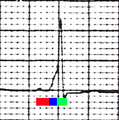Wolff–Parkinson–White syndrome facts for kids
Wolff–Parkinson–White syndrome (often called WPW syndrome) is a special condition that affects your heart. It means your heart has an extra electrical wire. This extra wire can make your heart beat too fast sometimes.
Most people with WPW live normal, healthy lives. Doctors can help manage the condition if it causes problems.
Contents
What is Wolff–Parkinson–White Syndrome?
WPW syndrome happens when there is an unusual electrical path in the heart. This path is extra and not normally there. It connects the top and bottom parts of the heart.
This extra path can make electrical signals travel too quickly. This causes the heart to beat very fast. It can also make the heart beat in an irregular way.
How Does Your Heart Normally Beat?
Your heart is like a pump that sends blood all over your body. It has four main rooms: two at the top called atria and two at the bottom called ventricles.
Normally, electrical signals start in the top right atrium. They travel through a special path called the AV node. This node acts like a gate, slowing the signals down. Then, the signals go to the ventricles, making them pump blood. This careful timing keeps your heart beating steadily.
What Goes Wrong in WPW?
In WPW syndrome, there is an extra electrical path. This path is often called an "accessory pathway." It bypasses the AV node. This means electrical signals can rush from the atria to the ventricles too fast.
When signals use this extra path, the heart's normal rhythm gets confused. It can lead to very fast heartbeats. This fast beating is called tachycardia.
What Are the Signs of WPW?
Many people with WPW syndrome have no symptoms at all. They might not even know they have it. For others, symptoms can appear suddenly.
Common symptoms include:
- A feeling of a fast or pounding heart (palpitations)
- Feeling dizzy or lightheaded
- Shortness of breath
- Feeling tired or weak
- Sometimes, low blood pressure
These symptoms usually happen when the heart beats very fast. If you feel any of these, it's important to tell an adult or a doctor.
How Do Doctors Find WPW?
Doctors can find WPW syndrome using a test called an electrocardiogram (ECG or EKG). This test records the electrical activity of your heart. It's quick and painless.
The ECG shows special patterns if you have WPW. One common sign is called a "delta wave." This wave shows that the electrical signal is using the extra path. Doctors might also use other tests to understand your heart better.
How is WPW Treated?
Treatment for WPW depends on your symptoms. If you have no symptoms, you might not need any treatment. Doctors will usually just watch your heart.
If you have symptoms, doctors might suggest different treatments:
- Medicines: Some medicines can help slow down your heart rate. They can also help keep your heart rhythm regular.
- Catheter ablation: This is a procedure where doctors use thin tubes (catheters) to find and block the extra electrical path. They use heat or cold energy to do this. It's a very common and effective treatment.
- Lifestyle changes: Avoiding things that trigger fast heartbeats, like too much caffeine, can sometimes help.
Living with WPW
Most people with WPW syndrome can live full and active lives. It's important to follow your doctor's advice. Regular check-ups help make sure your heart stays healthy.
If you have WPW, you might need to be careful with certain sports. Always talk to your doctor about what activities are safe for you. Learning about your condition helps you manage it well.
Images for kids
-
One beat from a rhythm strip in V2 demonstrating characteristic findings in Wolff–Parkinson–White syndrome: Note the characteristic delta wave (above the blue bar), the short PR interval (red bar) of 80 ms, and the long QRS complex (blue bar plus green bar) at 120 ms.
See also
 In Spanish: Síndrome de Wolff-Parkinson-White para niños
In Spanish: Síndrome de Wolff-Parkinson-White para niños
 | Sharif Bey |
 | Hale Woodruff |
 | Richmond Barthé |
 | Purvis Young |




